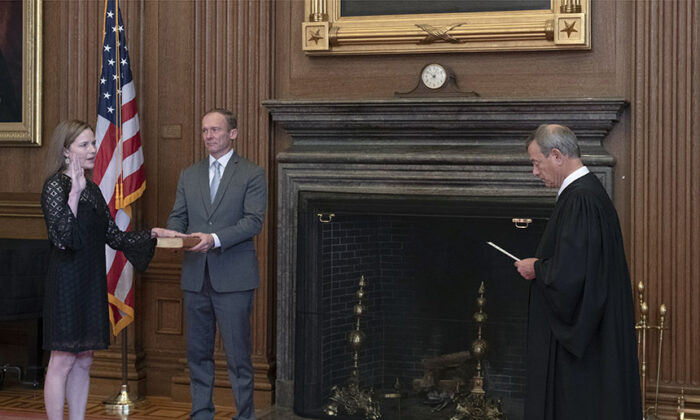Trump Administration Approves $2.37B More in Proposed Arms Sales to Taiwan
Justice Amy Coney Barrett took her second oath on Tuesday during a private swearing-in ceremony at the Supreme Court, meaning that she can begin participating in court decisions.
The newest member of the nation’s top court took her first oath—known as the Constitutional Oath—late Monday after she was confirmed by the Senate in a 52-48 vote. The first swearing-in ceremony was held at the White House and the oath was administered by Justice Clarence Thomas. President Donald Trump was also present at that ceremony.
Chief Justice John Roberts administered the second oath, known as the Judicial Oath, to Barrett in a private ceremony in the Supreme Court’s East Conference Room, the court said Tuesday. Justices of the Supreme Court are required to take both oaths before they can begin carrying out their duties in the court.
A formal investiture ceremony will take place at a later date, the court said in a statement on Monday night.
A little over an hour after the Senate confirmation vote, Barrett was sworn in during the ceremony at the White House as the 115th associate justice on the Supreme Court and the fifth woman to serve on the bench.
Prior to the confirmation vote, Senate Majority Leader Mitch McConnell (R-Ky.) delivered the final remarks to the Senate floor: “This evening, the Senate will render one of the most consequential judgments it can ever deliver. We will approve a lifetime appointment to the nation’s highest court.
“This is one of the most brilliant, admired, and well-qualified nominees in our lifetime,” McConnell said of Barrett. “By any objective standard, colleagues, Judge Barrett deserves to be confirmed to the Supreme Court.”
Meanwhile, Senate Democrats, who were opposed to the nomination, held an all-night session to protest the Republicans’ move to proceed.
Minority leader Chuck Schumer (D-N.Y.) railed against his Republican colleagues, accusing them of hypocrisy because they refused to vote on Obama’s Supreme Court nominee, Judge Merrick Garland, to replace the late Justice Antonin Scalia in 2016 because it was too close to the election.
“After refusing a Democratic nominee to the Supreme Court because an election was eight months away, they will confirm a Republican nominee before an election that is eight days away,” Schumer said on the Senate floor.
“Rather than accept the consequences of its own words and deeds, the Republican majority is lighting its credibility on fire. This hypocritical, 180-degree turn is spectacularly obvious to the American people,” he added.
McConnell has previously argued that it was appropriate to block Garland in 2016 because, at the time, the Senate and the White House were held by different parties—what’s known as a divided government.
“Since the 1880s, no Senate has confirmed an opposite-party president’s Supreme Court nominee in a presidential election year,” McConnell said on Sept. 18 in a statement following the death of Justice Ruth Bader Ginsburg.
After Barrett was sworn in on Monday, she briefly addressed the audience, vowing to carry out her duties with independence and impartiality from political pressure and policy preferences.
“It is the job of a judge to resist her policy preferences. It would be a dereliction of duty for her to give in to them,” she said. “Federal judges don’t stand for election, thus they have no basis for claiming that her preferences reflect those of the people.”
“This separation of duty is what makes the judiciary distinct among the three branches of government. A judge declares independence, not only from Congress and the president, but also from the private beliefs that might otherwise move her. The judicial oath captures the essence of the judicial duty—the rule of law must always control,” she added.
Barrett will now be able to sit with the other eight justices to hear and rule on cases, some of which have attracted great interest. A case challenging former President Barrack Obama’s signature healthcare law, the Affordable Care Act, will be heard on Nov. 10.
Focus News: Barrett Set to Begin on the Supreme Court After Taking 2nd Oath
China insider: US State Department Requests Think Tanks Disclose Foreign Funding
